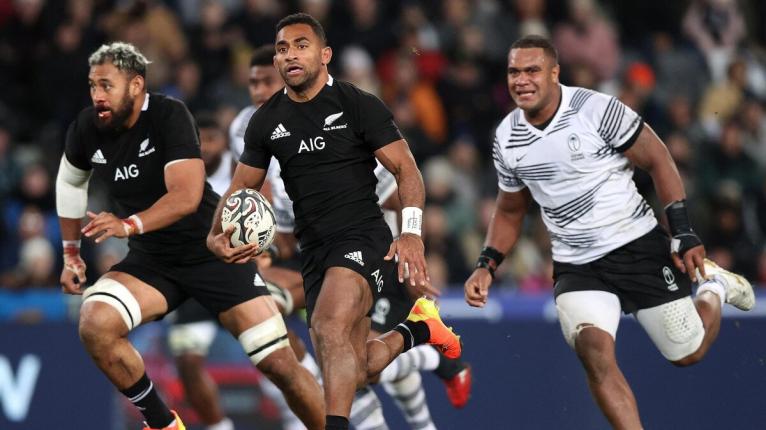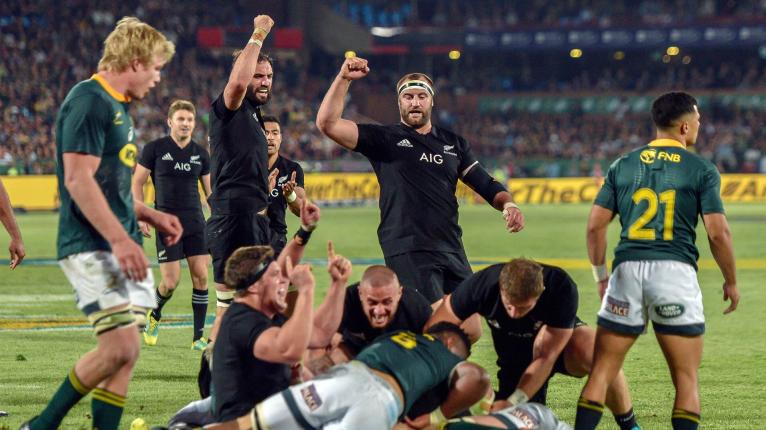It turns out the All Blacks may be jumping out of the frying pan of 2021 into the fire of 2022 as they are scheduled to open their season next year with a three-test series against Ireland followed by back-to-back tests against the Springboks in South Africa.
This will constitute the toughest start to an All Blacks season in decades, possibly even the whole of the professional age.
Ireland, of course, recently beat the All Blacks in Dublin, securing their third win against New Zealand in their last five tests.
South Africa played New Zealand twice in the Rugby Championship this year, the series split one each, but the Springboks may feel they had the better of the 160 minutes.
With away tests against England, Scotland and Wales to finish the year, 2022 has a make or break feel to it for the All Blacks, which is precisely what coach Ian Foster wants.

In his two years in charge, the All Blacks have played 21 tests – just four have been against Northern Hemisphere opposition. Even if we classify the Springboks as Northern-style opponents – which they are – the All Blacks have only played them twice since 2019.
What’s also slightly odd is that nine of their last 21 tests have been played in Australia, with another seven in New Zealand and the long and short of it is that the All Blacks don’t feel they have had enough exposure to top-flight Northern Hemisphere teams or indeed to the big cauldrons in which the European sides play.
It’s a big missing piece in the development of this All Blacks team and head coach Ian Foster believes one of the key tools to developing his team ahead of the World Cup is to fast track their exposure to Northern Hemisphere opponents (and South Africa would be included in this).
Since July 2017, the All Blacks have lost 10 tests and drawn three times. Ireland have won twice, South Africa twice (and a draw), the Lions once (and a draw) and England once. Australia have won three times – two of which were in dead rubber Bledisloe games – and drawn, and Argentina have won once.
The statistics support the sense that the All Blacks have become vulnerable to powerful northern sides who defend well, kick well and give New Zealand few easy opportunities to play their preferred counter-attack style.
If the Southern Hemisphere was dominating the world in the first half of the last decade, as was perhaps the case given that all four Rugby Championship teams made the semi-finals of the 2015 World Cup, it would seem that the balance of power has shifted in the last six years.
The arrival of Covid has created deeper concerns about that for the All Blacks because it has had the twin impact of removing South African sides from the Super Rugby landscape while reducing the number of inter-hemisphere tests.
There were no inbound or outbound tests in 2019 due to the World Cup and in 2020, the All Blacks were reduced to playing Australia four times and Argentina twice.
They had to scramble together a July programme this year against Tonga and Fiji and the trip to Europe this year was the first serious and prolonged exposure to northern sides since November 2018.
If the Southern Hemisphere was dominating the world in the first half of the last decade, as was perhaps the case given that all four Rugby Championship teams made the semi-finals of the 2015 World Cup, it would seem that the balance of power has shifted in the last six years.
The north – including South Africa, whose clubs are now part of a European competition and whose other players are mostly contracted to UK, Irish, French or Japanese teams – have connected with an effective style of rugby.

Ireland, Wales, France and England are consistently good and Scotland are emerging as a genuine force. Then there is South Africa, who have held their number one ranking since they took it in 2019 and have found a way to bully and muscle their way to victories almost regardless of what their opponents are trying to do.
The big change in the northern sides is the quality of their ball-playing, particularly the comfort level many of their forwards now have. Ireland’s tight five were as impressive at pass and catch as they were scrum and cleanout.
The game up north has become faster, more creative, more accurate and all built on a foundation of athletic, powerful forwards who compete well at set-piece and the tackled ball. And they play in front of vocal crowds at big stadiums which is why, after losing 29-20 to Ireland in Dublin, Foster said: “It’s been three years since we’ve been up here [in Europe].
“For a number of the players, they haven’t really been in a test up here and it’s very, very different.
“It’s very much a pressure game you’ve got to deal with. You’ve got to be at the top end of your discipline, because if they sense weakness and suddenly you start to give up a couple of back-to-back penalties, then you feed into a game that teams like to play.”
It’s not by any means a certainty that’s what their season will end up looking like, but locked in for sure at the moment are eight tests against heavyweight northern opposition and that is enough already to present the All Blacks with clear goals for 2022.
Looking at next year, it’s possible that only four of what could be 15 tests are against Southern Hemisphere opponents – with two against Australia and two against Argentina.
It’s not by any means a certainty that’s what their season will end up looking like, but locked in for sure at the moment are eight tests against heavyweight northern opposition and that is enough already to present the All Blacks with clear goals for 2022.
The first of those will be to win the series against Ireland and to do so in a manner that breaks the cycle of Ireland winning, New Zealand responding, Ireland winning, New Zealand responding – which has been the case since 2016.
The problem with this cycle from an All Blacks’ perspective is that they are the ones playing catch-up – being outsmarted by Ireland and then having to react before being outsmarted again.
Ireland coach Andy Farrell made this point himself, suggesting that the challenge for his team will be exactly the same – to break the cycle of win-loss-win-loss and find a way to stand up to the inevitable All Blacks backlash which will be heading their way in the first test of the series.

“History shows the next time you play against the All Blacks, that’s the most difficult,” said Farrell. “That’s part of our journey, it’s a great one and we want to test ourselves against the best.
“Getting the victory against them is all well and good, but we know it’s going to be harder down the track. We definitely have [poked the bear], no doubt about it.”
“It’ll be a tough tour. I’ve no doubt they’ll come firing back at us in the first test, but it’s about us finding out about ourselves. It’s the place that we want to be. The hardest part about sport is being consistent.”
And for the All Blacks to achieve their goal of winning the series and establishing themselves as the dominant partner in their relationship with Ireland, they will need to produce robust, physically effective performances that enable the attack game to function no matter what the Irish throw at them.
That’s the essence of what next year will be about for the All Blacks – ensuring they can play their game against all opponents.
The Springboks have troubled them the most in the last few years and next year presents the All Blacks with additional difficulty factors. They will head to South Africa just a week after the Irish series and play back-to-back tests there which they haven’t done since 2009.
Against the Boks earlier this year, they couldn’t build continuity because they couldn’t hold possession for long enough. Nor could they deal well with the high ball threat and the All Blacks lived off scraps and snatched opportunities while the Boks controlled the tempo of the game and where they wanted to play.
It was the same against Ireland – New Zealand only had 39 per cent of the ball and 33 per cent of the territory. That’s what has got to change – the All Blacks have to find ways to deal better with the defensive pressure exerted on them and also get better at exerting pressure on their opposition.
They know how to do that against the ruck and run Wallabies but they haven’t yet found a way to do it consistently against Ireland, South Africa or England.
The Springboks have troubled them the most in the last few years and next year presents the All Blacks with additional difficulty factors. They will head to South Africa just a week after the Irish series and play back-to-back tests there which they haven’t done since 2009.
They are doing this as part of significant changes that were made to the Rugby Championship at the end of 2019 but have so far been unable to be implemented because of the arrival of Covid-19.

Instead of New Zealand hosting South Africa and Argentina for one test each and then reciprocating, it was agreed that the competition would make better financial and environmental sense if the All Blacks played two tests against one of them at home and two tests against the other away, swapping them every year.
Kicking off the Rugby Championship against South Africa also mixes things up because since the beginning of the competition in 2012, the All Blacks have always opened against Australia in Australia, come home to play the Wallabies, Argentina and South Africa and then flown offshore to play the Pumas and Springboks in that highly specific order.
Too often it has meant the All Blacks have won the tournament long before their last match in South Africa. Partly that’s been because of their excellence, but there is no doubt that having three consecutive home games after a hop across the Tasman has been hugely beneficial.
What follows after the Rugby Championship next year is yet to be finalised, but the All Blacks have Wales, Scotland and England penned in for November and are looking at adding one or maybe two additional tests.
A third Bledisloe is a possibility, while an additional test against Ireland would create a Grand Slam itinerary – something the All Blacks haven’t taken on since they successfully swept all four nations in 2010.
A test against France is another option as new jersey sponsor, Altrad, has negotiated the right for at least one All Blacks match to be played in Montpellier at some time in the next six years.
It’s possible, maybe even probable, that New Zealand Rugby will schedule that fixture for next year as it would suit their commercial and playing ambitions.
Whatever the final schedule looks like, however, the All Blacks know they already face a monstrously tough 2022.



Until NZ can find some tight and loose forwards that can match the games of the Northern Hemisphere, then they are going to be in trouble. As an England fan, it please's me after many years of being out muscled and out skilled, we are not able to match and in some respects better the All Blacks.
I say that with the greatest respect. How a country of less then 4m can produce such a successful team is unbelievable. However, times are a changing!